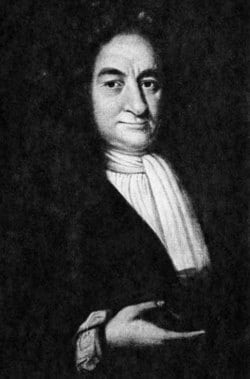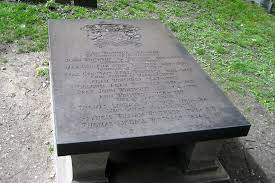Wait, Winthrop was a native of Massachusetts Bay Colony, son of John Winthrop Jr., and grandson to John Winthrop. He served as one of the judges during the Salem Witch Trials, and although he did preside over them, there is not much about his actions during the trial.

He also served in the colonial military throughout his life.
Early Life and Family
Wait, Winthrop was born in 1642 to John Winthrop Jr and Elizabeth Reade. His father was a governor of the Connecticut Colony, which was an offshoot of the Massachusetts Bay Colony founded by Thomas Hooker.
He preferred to be called "Wait," but his full name was Waitstill Winthrop.
Winthrop went to Harvard, but after two years, he left and went into the Connecticut militia, where he served for 10 years. He served in this position until his move to Boston, where he worked with his brother until the Dominion of New England was overthrown and the governor was replaced.
Military Career and Trials
He would then be appointed as commander-in-chief of the Massachusetts militia. During his time in the militia, he would take part in King Philip's War, which pitted the colonists against the Wampanoag Tribe led by Metacomet.
In 1692, he was appointed by Governor Sir William Phips as one of the magistrates of the Court of Oyer and Terminer who heard the Salem Witch Trials.
His actions during the trials are not spoken of. However, one can draw conclusions.
Unlike Nathaniel Saltonstall, he did not resign his position during the trials, so perhaps he was not as vocal throughout, but there is no record of him pushing back against those who were accused and how they were accused by the use of spectral evidence.
However, when Phips replaced the court in October of 1692, Winthrop would again be placed on the court and would hear the remaining cases of the Salem Witch Trials. This court was much more merciful and did not execute anyone for witchcraft.
It is doubtful that Phips would have put him on the new court if he did not have confidence that Winthrop would be more merciful than the previous court. At this point of the trials, public opinion had shifted, and Phips was releasing prisoners, vacating judgments against the accused, and many more actions that would upset Judge William Stoughton.
Later Years
When the provincial courts were organized under the new charter of the Province of Massachusetts Bay, Winthrop was one of the initial appointees as an associate justice of the Superior Court of Judicature, as the province's highest court was known.

He held this position until the death of chief justice and acting governor William Stoughton, at which time the Governor's Council appointed him to be chief justice. Political forces allied to him were preparing to travel to London to lobby on his behalf for the position of governor when it was learned that Joseph Dudley had received the appointment.
Winthrop then tendered his resignation as chief justice.
In 1708, Dudley reappointed him to be chief justice, a position he held until his death in 1717.
Winthrop was also active in other pursuits. When not working on his public duties, he devoted himself to agriculture and the study of medicine, often providing assistance in these arts to his neighbors
He died November 7, 1717, in Massachusetts.
<- Return to List of People Involved in the Salem Witch Trials
